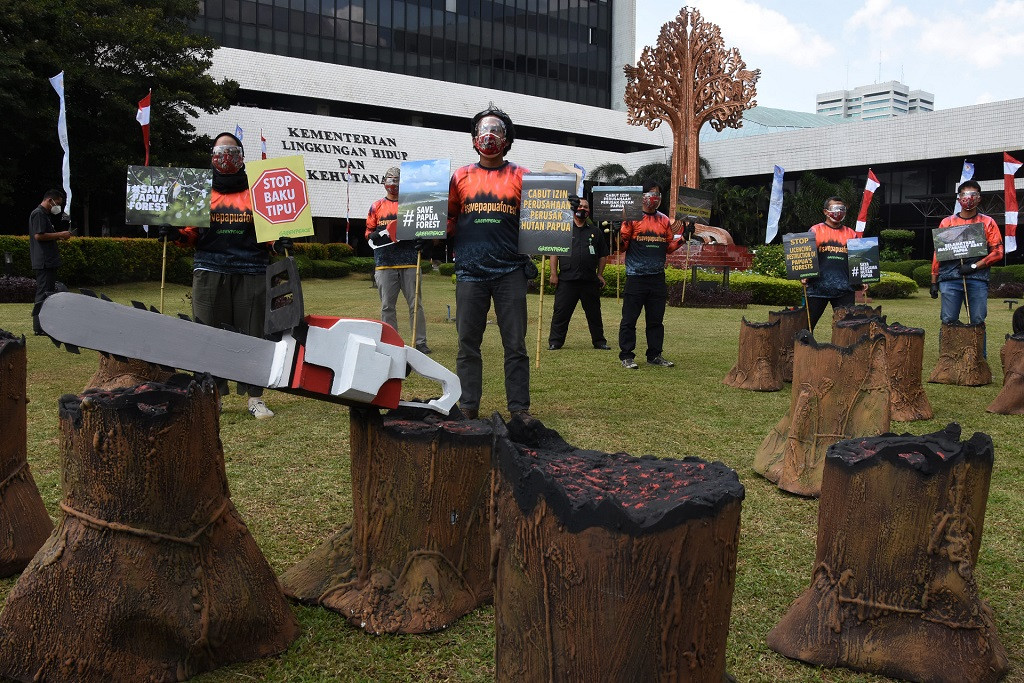Popular Reads
Top Results
Can't find what you're looking for?
View all search resultsPopular Reads
Top Results
Can't find what you're looking for?
View all search resultsLicensing loopholes threaten Papuan forests
Although the government has imposed a moratorium on concession permits for forest and peatland areas, Greenpeace Indonesia has found that companies can still request that the government exclude their concessions from the moratorium map.
Change text size
Gift Premium Articles
to Anyone
S
waths of forest in Papua are facing destruction because of loopholes in the government’s licensing system, Greenpeace Indonesia has found, despite a moratorium on forest concession permits and oil palm development.
The environmental organization analyzed Environment and Forestry Ministry records from 2000 to 2019 and found that some 950,000 hectares of forest in Papua and West Papua had been released for plantation concessions in the period.
Around 685,000 ha, or 70 percent of the concessions, still had tree cover. Some 440,000 ha was primary forest and around 108,000 ha was peatland, an ecosystem known for its role in mitigating climate change by storing carbon.
Greenpeace’s report corroborated other recent reports of deforestation in Papua, including a Center for International Forestry Research (CIFOR) study that found that around 168,000 ha of forest had been converted to plantations in the area since 2000.
Greenpeace Indonesia forest campaigner Arie Rompas said during a discussion on April 6 that the government ignored the fact that some concessions overlapped with primary forests, which were supposed to be subject to a permit moratorium.
Read also: Govt takes credit for lowest deforestation rate in 5 years
The government introduced a moratorium on concession permits for primary forest and peatland areas in 2011 and extended it every two years until August 2019, when President Joko “Jokowi” Widodo issued a presidential instruction (Inpres) to make the policy permanent.
However, the forest-clearance moratorium map is still subject to change as the Inpres stipulated that the map be revised every six months. Environmentalists say this could create a loophole allowing plantation firms to ask the ministry to exclude their concessions from the moratorium area.
Concession areas whose permits were issued before 2011 are exempt from the moratorium, as are several strategic government projects.
The latest revision, which took place in March, shaved 95,000 ha of protected land off the 2020 map, making for 66.18 million ha under the moratorium.
The Environment and Forestry Ministry’s then-acting director general for forestry and environmental planning Ruandha Agung Sugardiman said in March that the change in protected area was the result of updates to the ministry’s database of permits issued prior to 2011, changes in the natural landscape and a field survey of natural forests and peatland.
Greenpeace found that the government had granted requests from 11 plantation companies and one forestry company to remove their concession areas from the moratorium map from 2013 to 2015.
“Changes [to the moratorium map] were made following requests from the companies rather than the [natural changes] of the landscape in the area,” Arie said.
He added that the moratorium on oil palm plantation permits had also failed to stop the government from releasing forest areas for plantation concessions. The moratorium was instated in 2018 and is set to expire this year.
From September 2018 to August 2020, 22 palm oil companies operating in the country had been awarded forest area release permits, Greenpeace found.
“The government is still releasing forested areas despite the ongoing palm oil moratorium, including in Papua,” Arie said.
The environmental group also found that 26 concessions covering some 600,000 ha of released forest area in Papua had been left undeveloped, even though the firms had held the permits to develop the land for years.
Arie accused the companies of engaging in “land banking” to amass holdings for future sale or development. He urged the government to review company permits and revoke the permits of those found not to have developed their concessions.
Read also: Rich nation appetites driving tropical deforestation
Greenpeace campaigner on Papuan forests Nico Wamafma said the move to release forested land to corporations had shown that the government was not prioritizing the rights of indigenous Papuans in their homeland.
“Indigenous Papuan communities’ access to their rights and the [state] authority’s recognition of those rights are still very limited,” he said.
The government recognizes only about 44,000 ha of customary forest across the archipelago. Thousands of hectares of proposed customary forest are awaiting state approval.
The government has been working on the One Map Policy to address overlapping claims and land disputes through the integration of data maps owned by various institutions in the country.
However, the project has yet to finish despite years in development. Environmentalists have also criticized the government for failing to include the claims of indigenous communities, as the datasets for the integrated map are mainly from government institutions.
Nico said the government should have put indigenous people and native land owners first. “Papua is not an empty land. Don’t look only at the forests and resources on this island because there are more than 250 ethnicities living here.”
Environment and Forestry Ministry's Ruandha did not respond to The Jakarta Post’s request for comment on the matter.










